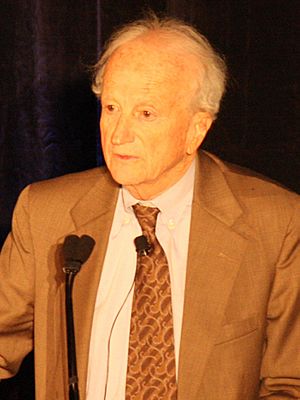Gary Becker facts for kids
Quick facts for kids
Gary Becker
|
|
|---|---|

Gary Becker speaking in Chicago, May 24, 2008
|
|
| Born |
Gary Stanley Becker
December 2, 1930 Pottsville, Pennsylvania, U.S.
|
| Died | May 3, 2014 (aged 83) |
| Institution | Columbia University (1957–1968) University of Chicago (1968–2014) |
| Field | Economics |
| School or tradition |
Chicago School of Economics |
| Alma mater | Princeton University University of Chicago |
| Doctoral advisor |
H. Gregg Lewis |
| Doctoral students |
David O. Meltzer Russ Roberts Walter Block Shoshana Grossbard Darius Lakdawalla Rodrigo R. Soares |
| Influences | Milton Friedman Theodore Schultz |
| Contributions | Economics of Discrimination (1957) Human Capital (1964) Allocation of time (1965) Economics of crime and punishment (1968) A Treatise on the Family (1981) rotten kid theorem |
| Awards | John Bates Clark Medal (1967) Nobel Memorial Prize in Economic Sciences (1992) Pontifical Academy of Sciences (1997) National Medal of Science (2000) John von Neumann Award (2004) Presidential Medal of Freedom (2007) |
Gary Stanley Becker (December 2, 1930 – May 3, 2014) was a very important American economist. He won the Nobel Memorial Prize in Economic Sciences in 1992. He was a professor of economics and sociology at the University of Chicago. Becker was a key leader in the "Chicago school of economics," a group known for its special way of thinking about economic ideas.
Becker also received the United States Presidential Medal of Freedom in 2007. This is one of the highest awards a civilian can get in the U.S. Many experts thought he was one of the most important social scientists of his time.
Becker was one of the first economists to study topics that usually belonged to sociology. These included things like discrimination, crime, how families are organized, and even why people develop habits. He believed that many human behaviors, even those that seem self-destructive, can be understood as people making logical choices to get what they want. He also studied human capital, which means the skills, knowledge, and experience that people have.
Contents
Gary Becker's Life and Work
Gary Becker was born in Pottsville, Pennsylvania, in 1930. He went to Princeton University and earned his first degree in 1951. After that, he went to the University of Chicago for his advanced studies. He received his Ph.D. in 1955.
Early Influences and Teaching
At the University of Chicago, Becker was greatly influenced by Milton Friedman, another famous economist. Becker said Friedman was the best teacher he ever had. Friedman's classes helped Becker become even more interested in economics. Other important teachers for Becker included Gregg Lewis and T. W. Schultz.
Becker worked as a professor at the University of Chicago for a few years. In 1957, he moved to teach at Columbia University in New York. He also did research at the National Bureau of Economic Research during this time.
Return to Chicago and New Ideas
In 1970, Becker returned to the University of Chicago. In 1983, he was given a special role, teaching in both the Economics and Sociology departments. This showed how his ideas connected different fields of study.
Becker was recognized with many awards for his groundbreaking work. He won the John Bates Clark Medal in 1967. This award is given to an American economist under 40 who has made a significant contribution. He also became a member of important groups like the National Academy of Sciences.
Nobel Prize and Later Years
In 1992, Gary Becker received the Nobel Memorial Prize in Economic Sciences. He won it because he "extended the domain of microeconomic analysis to a wide range of human behavior and interaction, including nonmarket behavior." This means he used economic tools to understand choices people make outside of traditional markets, like decisions about education, family, or crime.
He also received the National Medal of Science in 2000. This is a top award for scientific achievement in the United States. Becker wrote a regular column for Business Week magazine for many years. He also started a blog with a judge named Richard Posner.
Gary Becker was married twice. He had two daughters with his first wife, Doria Slote. Later, he married Guity Nashat, who was a historian. Becker passed away in Chicago in 2014 at the age of 83. His work continues to influence how people think about economics and human behavior today.
See also
 In Spanish: Gary Becker para niños
In Spanish: Gary Becker para niños

